Introducing the BEST VALUE whale watching hosts
Fantasea Cruising’s Marine Biologists
What makes our BEST VALUE whale watching adventures a step above the rest?
When you join Fantasea Cruising’s BEST VALUE whale watching cruise, you can do so knowing that we want you to get the most out of your onboard experience. Our BEST VALUE wildlife adventure by sea is truly an adventure of a lifetime, and we want you to remember your experience forever!
Our highly skilled whale watching crew strive to provide an exciting and educational experience for our guests. Fantasea Cruising’s BEST VALUE whale watching adventures are designed to connect you to professional marine biologists, who will provide you with interactive commentary throughout the cruise. Up-close encounters are complimented by the latest in whale knowledge and scientific research, providing an immersive experience suitable for all ages and backgrounds.
Fantasea Cruising is proud to introduce our team of experienced Marine Biologists!
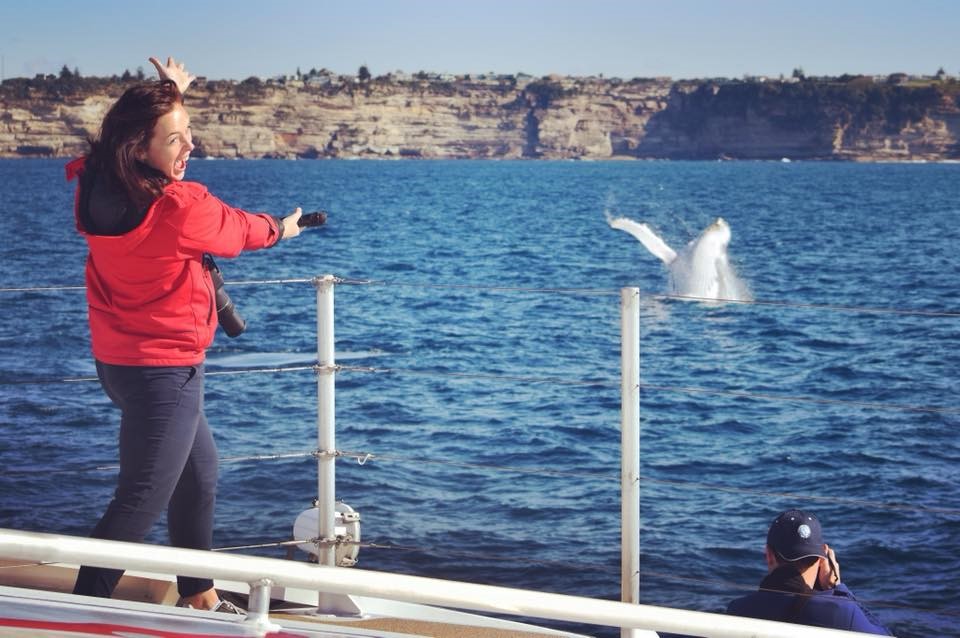
Cassie (Cass)
Job: Aspiring whale whisperer
Age: 26
Home: Inverell (regional NSW) but I consider Sydney my home now
Education: Bachelor’s Degree in Marine Science and Management from Southern Cross University and currently studying for my Master’s Degree in Conservation Biology at Macquarie University
-
When did you decide you wanted to be a Marine biologist?
Growing up on a small farm over 300km inland I wasn’t exposed to the sea much throughout my childhood like many marine biologists. However, I was lucky enough to spend a lot of Christmases in a small coastal town with my extended family. I think it was during these times that I unknowingly developed a love and appreciation for the ocean. I always felt more excited by swims at the beach and walks along sea walls than walks through the paddocks and bush back home.
How did you become a Marine Biologist?
After High School, I had a ‘gap year’ where I travelled overseas and volunteered in a Seal Research and Rehabilitation centre for a few months. When I returned, I began my bachelor’s degree in Marine Science and Management. Throughout my time studying I volunteered with a lot of organisations to try and gain as much experience as possible. After I graduated university, I did an internship with the Centre for Coastal Studies in Boston, USA. This then led me to where I am today!
What advice would you give to someone looking to become a marine biologist?
One of the most popular comments when speaking to people about marine biology is ‘Oh, I always wanted to be a marine biologist when I was a kid!’. For some reason it seems like such an unattainable career. But my advice is, if you want to do it… go for it! There are many different facets to marine biology. There’s a niche to suit everyone. Getting involved with small volunteer organisations is great place to begin and don’t be afraid to reach out to people and just ask questions.
What is your favourite part about being a Marine Biologist?
There are a few things!
I love that the ocean is so big and there are so many mysteries that I learn new things daily.
I love that I don’t have a regular office, being able to call the harbour and the ocean my workplace is pretty dang cool.
I love being able to introduce people to the wonderful world of whales! Seeing people react to a whale jumping out of the water is definitely one of my favourite things!
What next? How can I help conserve the ocean from home?
Unfortunately, the world’s oceans are facing many issues today, mostly due to the actions of humans. The oceans are so huge that it may seem like there couldn’t possibly be anything that we could do at home to help, but that’s not true! Some things we can do:
Minimise single plastic use.
- Invest in a reusable coffee cup and water bottle. (the coffee tastes better out of one than the takeaway cups anyway)
- Ditch plastic bags and use reusable ones. Plastic bags floating in the water look a whole lot like jelly fish which is a turtle’s favourite food!
- Say no to plastic straws
- Take your own reusable food containers when grabbing lunch on the go.
Be conscious of your carbon footprint.
- Turn off appliances when you’re not using them
- Don’t run the AC or heater when it isn’t necessary.
- Don’t use the clothes dryer unless it’s raining and it’s vital. We have so much beautiful sun!
- Use public transport, bike or walk if possible, instead of driving
Choose sustainable seafood.
- Overexploitation of fish stocks is a massive problem around the world, there are smart phone apps that will let you know what seafood is sustainable and which seafood should be avoided. This is great when dining out or going grocery shopping.
- Don’t forget to check your pet-food too!
Pick up rubbish.
- If you see rubbish on the ground when you’re out and about, pick it up and put it in the bin! Even if you’re not near the ocean, it’s important to remember that all waterways lead to the ocean!
Become involved.
- There are many organisations (small and large) dedicated to helping the oceans. Many of which run on volunteer support. Reach out and become involved. The more you learn, the more you’ll appreciate the ocean.
Encourage others to do the same!
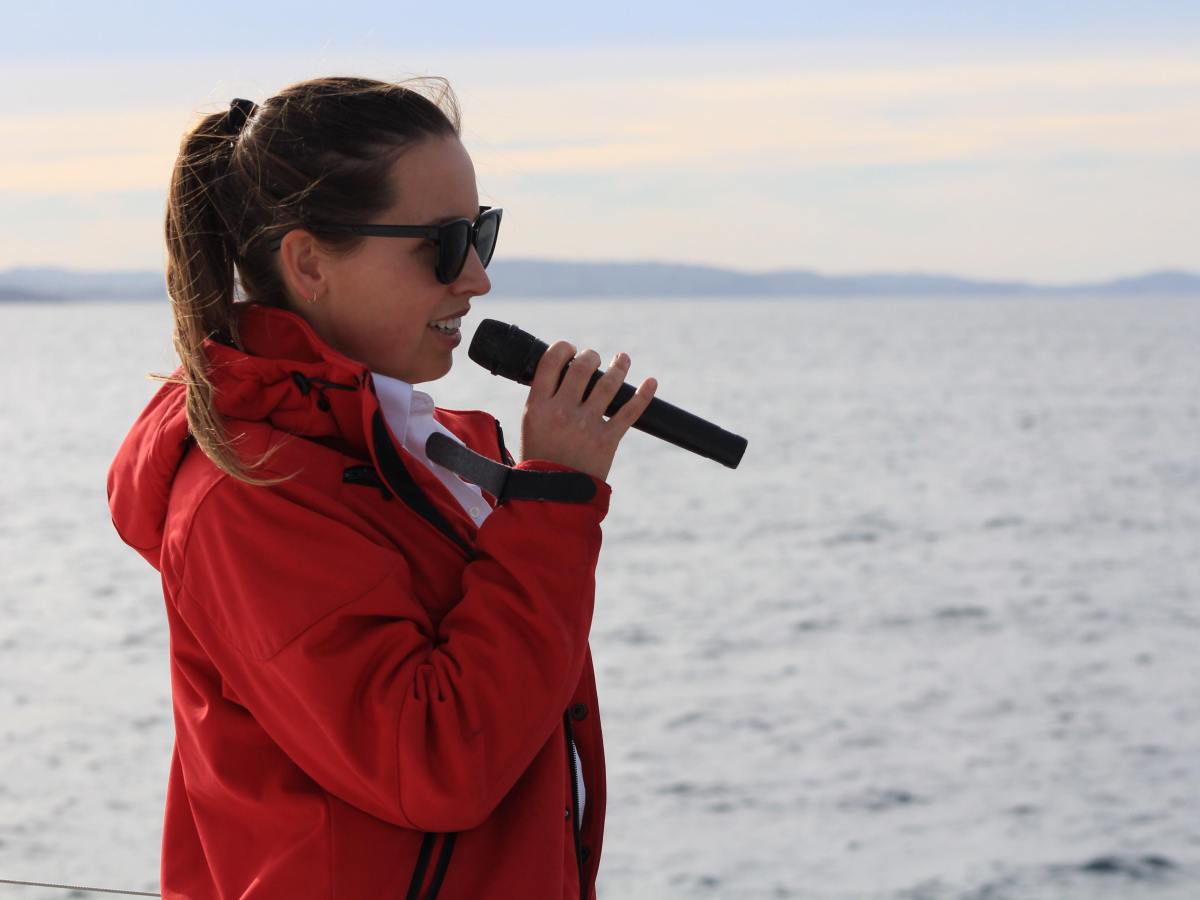
Emma
Job: Marine Biologist
Age: 21
Home: Sydney
Education: Bachelor of Science (Environmental Sciences) at the University of Technology, Sydney.
-
When did you decide you wanted to be a Marine biologist?
I love the sea and have always been interested in learning more about it and the creatures that call it home. By the time I finished high school I knew I wanted to study marine biology.
How did you become a Marine Biologist?
During my Bachelor’s degree at the University of Technology Sydney, I majored in environmental science and I learnt a lot about the ocean environment. I’ve also volunteered on several marine research projects. At the moment I’m completing a research project looking at coral.
What advice would you give to someone looking to become a marine biologist?
Go for it! Marine biology is quite a diverse field. Whale behaviour? Coral reefs? Antarctic ecosystems? The list goes on. Learn as much as you can in high school and Uni to decide what you would like to focus on. Then go and volunteer to get some hands-on experience. It takes a bit of hard work, but you’ll be a marine biologist before you know it.
What is your favourite part about being a Marine Biologist?
The fact that I get to study what I love and work in some awesome places. Also, that I can use my skills and research to help protect and conserve the marine environment.
What next? How can I help conserve the ocean from home?
Luckily you don’t need to be a marine biologist to be able to help conserve the ocean. Plastic pollution is a major issue affecting sea life, so even something as easy as reducing your plastic usage can have a big impact (just say no to single use plastic bags, take away coffee cups balloons and plastic straws). Marine life is also affected by overfishing and bycatch so be mindful when eating seafood and make sure you choose the most sustainable option. For every person who does these simple things, the problems our oceans face get a little smaller. The more people caring, the healthier the oceans!
Fantasea Cruising Marine Biologist Alumni
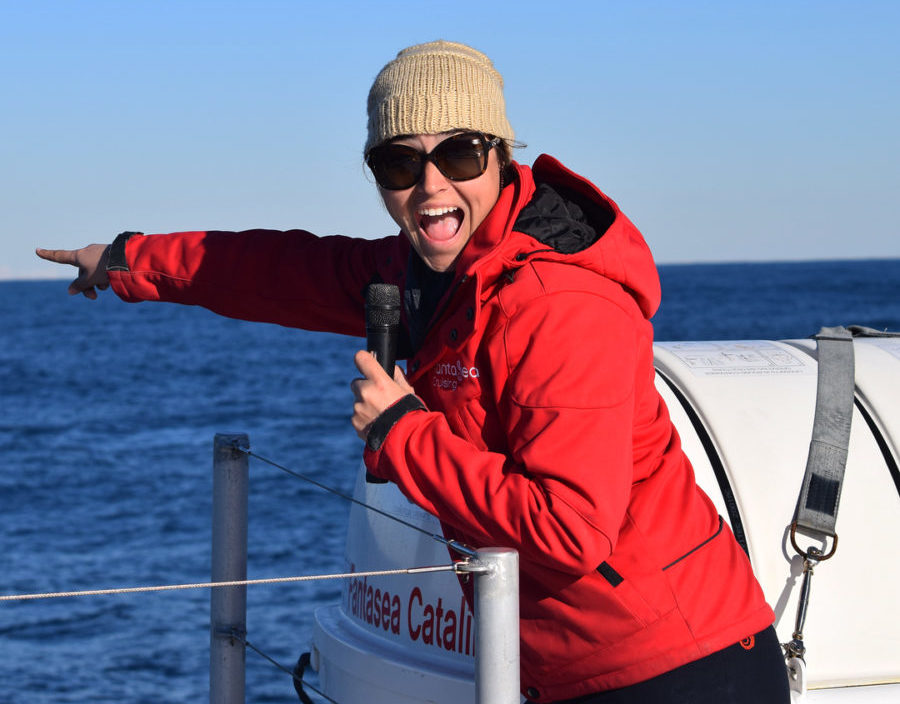
Jessica
Job: Marine Biologist with FantaSea Cruising in Sydney
Age: 25
Home: Maui, Hawaii
Education: Earned my Bachelor of Science in Environmental Sciences at Ferrum College in Virginia. Also earned two minors in Sustainability & Ecotourism and Global Perspectives. Currently attending University of Sydney graduate program for a Research Master’s in Marine Sciences & Development.
-
When did you decide you wanted to be a Marine biologist?
I knew I wanted to work outdoors ever since I was a child. My family cultivated my love for the earth and its natural wonders from a young age. We would travel to exotic new places and learn about wildlife that was vastly different from our own.
I was born and raised in central Illinois (USA), which is entirely land-locked, so I found the ocean to be the most fascinating place of all. Being beneath the surface was like being on another planet, and I wanted to know all there was to know about this beautiful place.
How did you become a Marine Biologist?
I attended university in Virginia, where I developed my foundational scientific skills, practical fieldwork, lab experience and knowledge. At the time, I was not specialized, and was far away from believing I could make a living by working on the ocean. I actually did my undergraduate thesis researching jaguars in the tropical rainforests of Belize!
After graduation, I took the plunge into Marine Biology (pun intended!). I moved to the Bahamas to perform coral reef surveys for the Bahamian National Trust, and then flew to Fiji where I developed a marine education program for a scuba diving resort. I also completed my divemaster and dive instructor training. Before coming to Sydney, I worked in Hawaii as a whale-watch tour host, opening my eyes to the wonderful world of whales.
I am currently attending the University of Sydney graduate program in Marine Sciences & Development, studying Crown of Thorn Starfish and their impact on the Great Barrier Reef.
What advice would you give to someone looking to become a marine biologist?
The most invaluable advice I can offer someone looking to become a marine biologist is:
1. Be open to interdisciplinary skills and growth; it’s such a massive part of this life. Any marine biologist will tell you that working in this field requires many ‘hats’.
In my experience as a marine biologist, I have been an educator, researcher, lifeguard, deckhand, vessel maintenance personnel, sales-person, snorkel/dive guide, interpreter, server, swim teacher, free diver, equipment technician, and much more.
2. Persistence is key in this competitive industry. Your “dream job” is out there but remember the journey is just as amazing. Volunteer, go to events, attend workshops, assist in labs; gain experience wherever and however you can.
3. Your experiences towards becoming a marine biologist will shatter your expectations, broaden your horizons, and maybe require you to step outside of your comfort zone to get there.
4. Don’t forget about the support of your fellow scientists! The field of marine biology is full of amazing people motivated to save the oceans and its wildlife. It is amazing how many people will take the time to give advice if you simply reach out and ask.
What is your favourite part about being a Marine Biologist?
The most favoured part about being a marine biologist is watching guest reactions. Often marine biologists are on the forefront of life-changing experiences, like seeing a whale or witnessing someone breathe underwater on SCUBA for the first time. Confronting their fears and swimming with sharks or experiencing an epiphany about plastic pollution.
The most satisfying part of being a Marine Biologist is knowing my job can have a profound effect on someone’s life. This makes it memorable and rewarding, knowing that memory will additionally serve as a foundation for their future ocean appreciation.
What next? How can I help conserve the ocean from home?
The ocean is struggling! Rising sea levels, warming waters, plastic pollution and overfishing threaten many of the places we travel to see. In addition to appreciating the ocean and its wildlife, we must all attempt keeping it safe from our impact. After all, “ocean conservation isn’t about fish; it’s about people.”
People tend to think they can’t make a difference in ocean conservation. Believing the insignificance of their efforts or that they live too far away from the coastline prevents them from acting. BUT, there is so much you can do, from anywhere in the world!
Some easy actions that really help
- refusing a straw
- utilising reusable bags when shopping,
- turning lights off when not required
- taking public transport
- carpooling
- taking the stairs instead of the elevator
- choosing sustainably caught seafood at restaurants.
It all makes a difference.
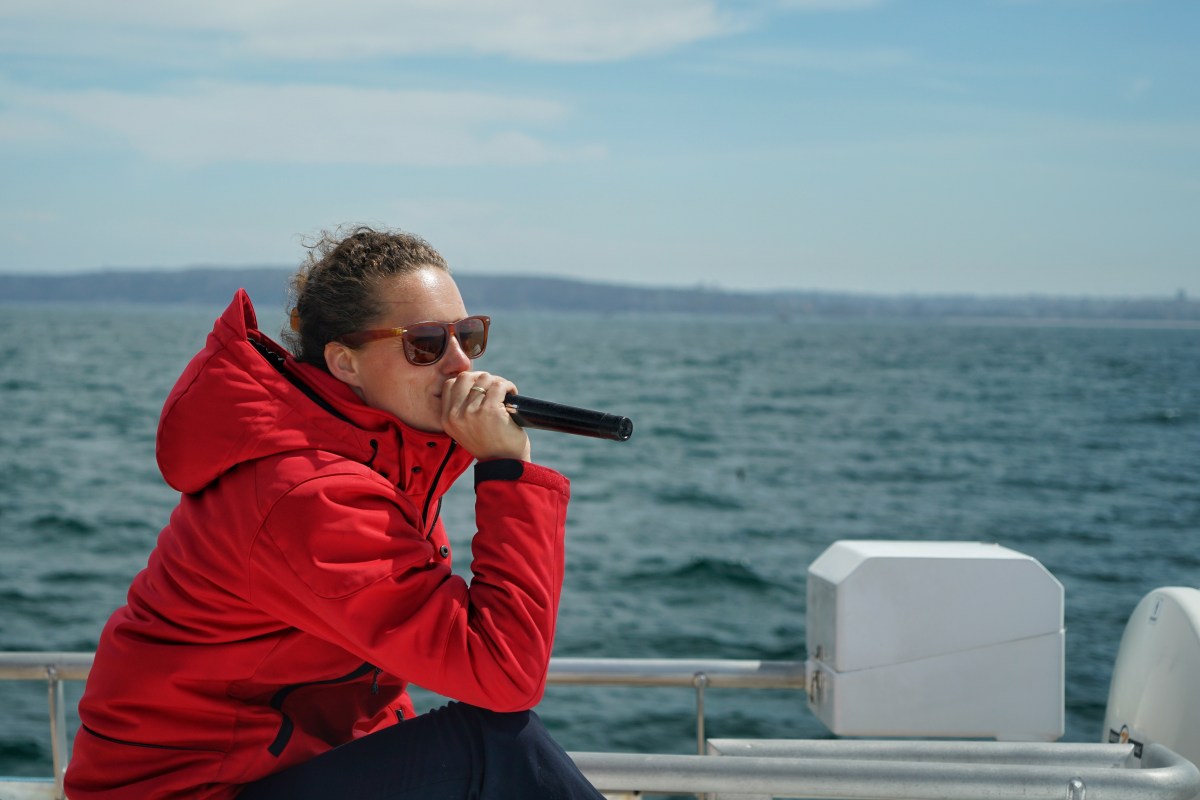
Julia
Job: Marine Biologist with FantaSea Cruising
Age: 30
Home: Sydney
Education: Marine Biologist
-
When did you decide you wanted to be a Marine biologist?
I was always fascinated by nature, most of my childhood I spent outdoors. I was born and raised in central Germany, so the ocean was rather far away. My family introduced me to the fascinating marine world during summer holidays. My love for the ocean was inspired during my first scuba dive. After learning to dive in the Philippines, I continued to become a dive master. Being inside the amazing element water makes me feel better and therefore I wanted to learn how I can give something back.
How did you become a Marine Biologist?
My first degree I obtained at a university in Germany, there I became a Bachelor of Biology, with a strong focus on aquatic ecology. But I always knew that my passion lays in the marine world. When I had the opportunity to move to Australia it was without question that I would study marine biology. During my master’s degree my passion was fostered even more, I had the chance to see and learn more about the fascinating underwater world around Australia.
What advice would you give to someone looking to become a marine biologist?
Follow your passion, even if you are from an area far away from any water, if it is your dream to become a part of this fascinating world you will find a way. Even though you might have to jump over some hurdles, or the path might not always be clear during your education, there are several others that have gone the same way, seek their help.
What is your favourite part about being a Marine Biologist?
Being able to open other people’s eyes towards this fascinating world. If it is during whale watching, snorkelling, diving or just a walk along the beach, to inspires people about our oceans and what they can do for them is a great part about being a marine biologist.
What next? How can I help conserve the ocean from home?
Everyone can help the currently struggling oceans all around the world. Several congregating effects, like temperature changes, increased populations, overfishing and plastic and other pollutions are taking their toll on our oceans. Regardless on where in the world you live or how insignificant you think your actions might be, everyone can help! Simple things everyone can do are for example: minimising plastic, don’t use straws, plastic bags or single-use coffee cups; reduce emissions, by using public transport, switching of unnecessary electricity like aircon or light when they are not needed; watch what you eat, only buy fish from sustainable resources and reduce your meat consumption to minimise indirect effects like runoff of fertilisers into our oceans. If every person in the world only does a small part to help, the combined effort will help to safe our oceans.
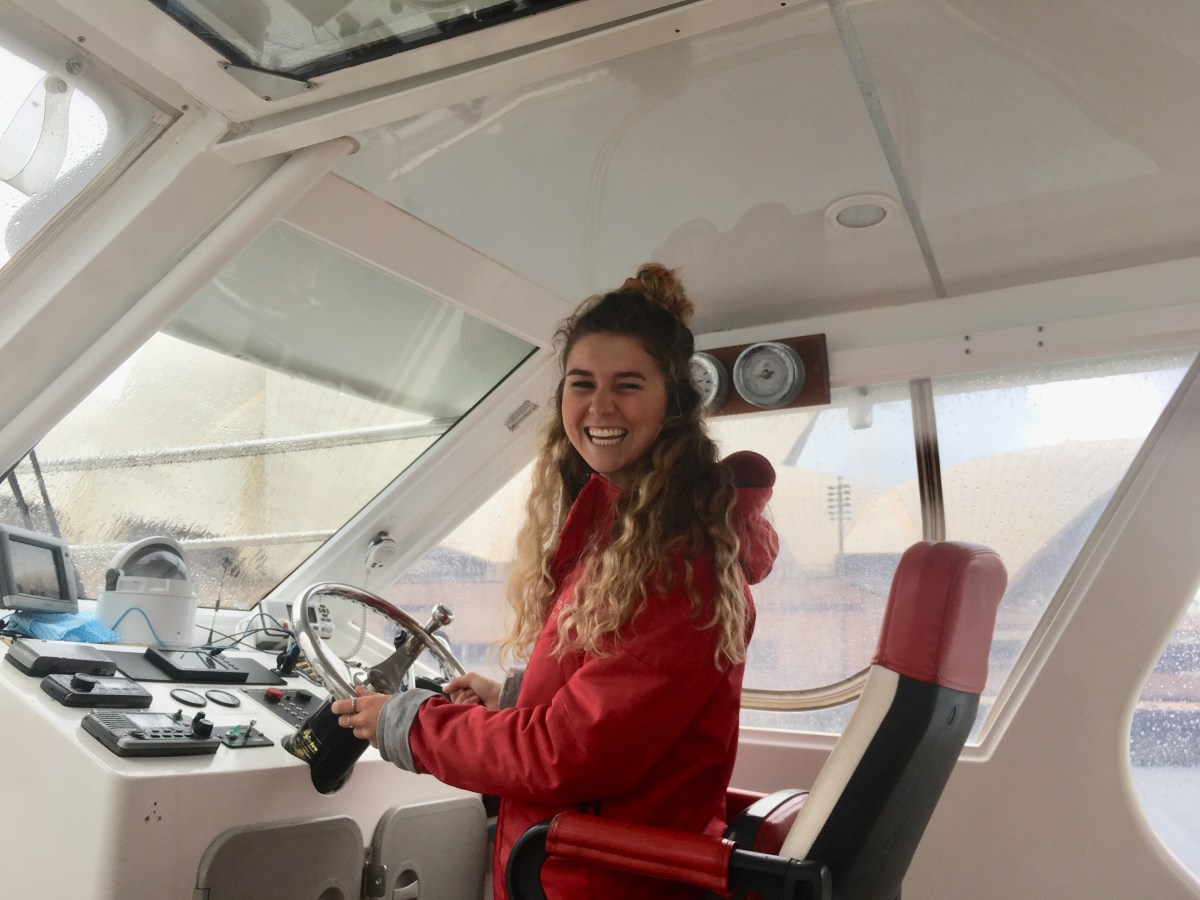
Kaitlyn Zerr
Job: Marine Biologist
Age: 24
Home: Langenburg, Saskatchewan, Canada
Education: Bachelor of Science: Honours in Marine Biology from Dalhousie University, Canada
-
When did you decide you wanted to be a Marine biologist?
When I was 10, I saw the ocean for the first time. I quickly realised that the power in the waves and currents demanded respect but I stayed curious about what lived beneath the surface. After high school, I continued to think about marine biology but I felt unsure about moving so far from home to the coast. Instead, I completed two years of a biology degree in Saskatchewan, and then I decided to test my love for the ocean. I moved to Honduras for a summer to intern at a dive centre and received my Divemaster certification. Every time I put my face in the water I felt transported to another planet and then I knew I would move anywhere to pursue a lifetime of protecting the ocean.
How did you become a Marine Biologist?
After coming home from Honduras, I transferred universities and moved to the east coast of Canada. I studied at Dalhousie University from some of the world’s leading ocean scientists. Through a combination of field work and studies made it to where I am today, but I know I have so much more learning to do in order to grow into the role of a Marine Biologist.
What advice would you give to someone looking to become a marine biologist?
Every marine biologist I’ve met (including myself) is motivated by passion. It’s the most rewarding, yet challenging career and I can promise that you will never be bored!
My advice:
Be prepared to work for free. It’s not unlike other careers where you are expected to carry out an internship that involves little to no pay. But don’t be discouraged by this! Internships are a great way to meet people who have been where you are and are now successful scientists- a perfect opportunity to learn from them! These people will often mentor you far into the future so be sure to build great relationships with them. Companies these days can try to take advantage of the fact that you need work experience. Look to complete internships that have opportunities for employment if you perform well!
Here’s a link to great internship options for budding marine scientists:
https://www.conservation-careers.com
Have a side hustle. Receiving a good wage in this field can be difficult and we all have bills to pay! To take the pressure off of climbing the marine-biology-ladder as fast as possible, develop other skills that can help you reach this goal. Dive instructor jobs are offered worldwide and can keep some money in your pocket. Hospitality is a good option as well! Throughout university and during internships, I’ve held many serving jobs. It’s not the field I’m passionate about but it’s taught me some great “people skills” that I’ve actually turned to as a marine biologist.
Find a way to stay connected to the ocean. The path to a career in marine biology is a long road so don’t let yourself forget why you stepped on this path in the first place! I love free diving and snorkelling. It’s my way of being in the water with no expectations or pressure. When life gets stressful, I can grab my fins and mask and explore in the ocean, reminding myself of why I picked this path. Find your reminder and turn to it whenever you feel uncertain.
What is your favourite part about being a Marine Biologist?
I love storytelling and talking about the ocean, but nothing compares to showing someone the underwater world for the first time. The ocean is like having space on earth; the feeling of being weightless in the water, the mystery of every creature you see. I feel so lucky because I often get to be the person that makes someone feel comfortable enough in the water to experience this world! There’s no better feeling for me then to hear someone cheer with excitement from their snorkel when seeing a reef or life in the ocean for the first time.
What next? How can I help conserve the ocean from home?
Saving the ocean can seem like a huge weight to take on. But if everyone makes small changes in their everyday lives, we can make a huge difference!
Here’s some ideas:
Eat sustainable seafood. The best way to do this is to buy fish that have a healthy abundance in the ocean as well as fish that are in season and from local fishermen. Download the “Sustainable Seafood Guide” to make it easy when you’re shopping! You can type in your fish of choice and it will give you all you need to know!
Stay away from single use plastics.
Plastic is now found in every corner of our oceans. Things like coffee cups or straws, that we use for maybe 10 or 20 minutes, stay in our oceans long after we’re gone! Plastic doesn’t breakdown. Instead it breaks up into tiny pieces that are ingested by seabirds and turtles confusing the plastic for food. There are tons of cool companies, like SoL, that offer stylish alternative to disposable coffee cups or straws. Globelet is another great company that will actually supply your events with reusable alternatives! Too easy.
Pick it up.
I think the easiest way to help our oceans is to just stop stepping over litter when we come across it. Here in Sydney, so many of us live close to the water and use the ocean as our playground. We have the opportunity to give back to the ocean everyday by simply bending down to pick up a plastic bottle or bag that we come across. That’s one less bottle or bag that makes it into the stomach of a sea turtle or whale so it makes a huge difference! You never know what creatures you’re saving by this simple act. It’s one of my favourites because it’s so powerful yet so easy.
Never feel like the things you do aren’t making a difference. You never know who is watching and may be inspired to do the same.
